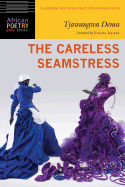
With a natural approach to the physicality of her characters' lives and struggles, Botswanan poet Tjawangwa Dema uses her work to explore large questions of gender, identity and labor. The pieces in The Careless Seamstress live at the intersection of these themes, showing how one moment or action brilliantly encapsulates the whole.
In the finest example of this, "Lares," a group of women are confronted with deciding the fate of a baby orphaned in childbirth. "Let me tell you what it's like/ to carry a child that's not yours/ while you fetch water with a steel bucket pissing on your head," the narrator laments. She speaks on behalf of her group who, at first, agree the child should be killed and buried with his mother. Here work, survival and maternity are intertwined and treated with open eyes and frank prose.
Questions of care also arise in "The Three-Body Problem," as a woman considers how her mother has given her life over to taking care of her brother. Seeing that "He is her life's work," the narrator wonders "When she is gone,/ who will inherit her language/ of worry...," well aware that the expectation is for her to take up her mother's labor. Like the group in "Lares," the women of "The Three-Body Problem" must give themselves over to saving the men in their lives. With an unflinching eye, Dema forces her reader to witness that giving, and question whether it is worth it. --Noah Cruickshank, director of communications, Forefront, Chicago, Ill.

